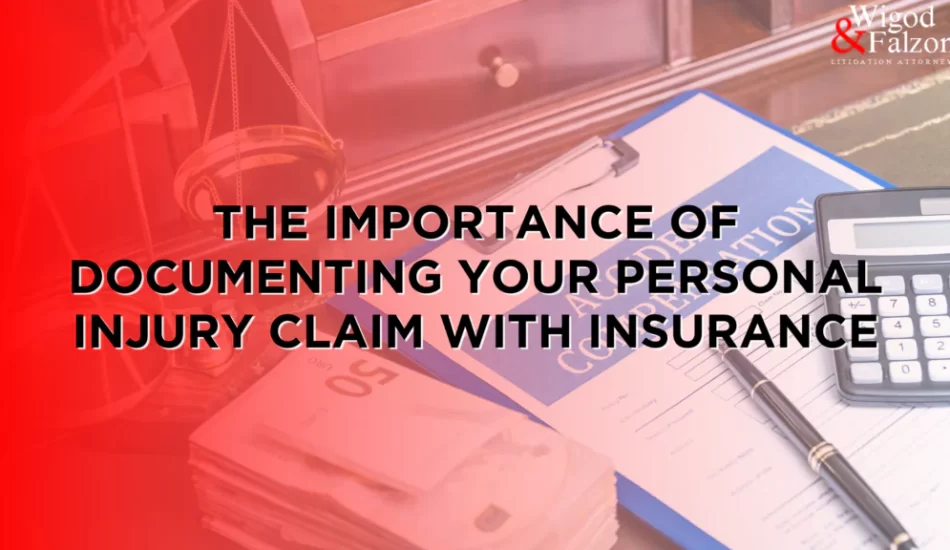The Importance of Documenting Your Personal Injury Claim with Insurance

Accidents happen when you least expect them, and often leave you dealing with physical injuries, emotional distress, and a financial burden. In such challenging times, having insurance can provide a lifeline to help you recover and get back on your feet. However, the effectiveness of your insurance claim heavily relies on the quality and thoroughness of your personal injury legal documents.
Whether it’s a car accident, a slip and fall, or any other incident resulting in personal injury, proper documentation can make or break your insurance claim. Below, we highlight the importance of documenting your personal injury claim with insurance.
The Foundation of a Strong Claim
When it comes to filing a personal injury claim with your insurance company, documentation is your strongest ally. It serves as the foundation on which your claim rests and helps establish the veracity of your case.
Detailed and organized documentation can strengthen your position and increase the likelihood of a fair settlement.
1. Medical Records and Expenses
Proper documentation of your medical treatment is crucial. Keep records of all medical visits, prescriptions, treatments, and therapies related to your injuries.
Request copies of medical reports, doctor’s notes, and test results. Not only do these documents provide evidence of your injuries, but they also demonstrate the extent of your medical expenses, which is vital for reimbursement.
2. Incident Documentation
Write down the details of the incident as soon as possible while the memories are still fresh. Include information such as date, time, location, weather conditions, and any factors that may have contributed to the accident.
Take photographs of the accident scene, injuries, and property damage. Visual evidence can be incredibly powerful in supporting your claim.
3. Witness Statements
If there were any witnesses to the incident, obtain their contact information and ask if they’d be willing to provide a statement. Witness accounts can corroborate your version of events and add credibility to your claim.
4. Communication with Insurance Company
Keep a record of all correspondence with your insurance company. This includes emails, letters, and notes from phone conversations. This documentation ensures transparency and can prevent any misunderstandings regarding the progress of your claim.
5. Police and Accident Reports
If applicable, obtain a copy of the police report or any accident reports generated by relevant authorities. These official documents can provide an unbiased account of the incident and can carry significant weight in your claim.
Benefits of Thorough Personal Injury Legal Documents
There are several benefits to providing accurate and thorough documentation to your insurance company, including:
1. Higher Credibility
Detailed and organized documentation demonstrates your commitment to transparency and honesty. It reduces the chances of your claim being dismissed or undervalued due to lack of evidence.
2. Accurate Compensation
Accurate documentation of medical expenses, lost wages, and property damage ensures that you’re compensated for the full extent of your losses. Without proper documentation, you might miss out on rightful compensation!
3. Faster Processing
Clear and comprehensive documentation can expedite the claims process. Insurance adjusters can quickly assess your case, leading to a faster resolution.
4. Strong Negotiation
If your claim requires negotiation, having well-documented evidence provides you with a stronger position. You can effectively advocate for your needs and justify your requested settlement.
5. Reduced Stress
When you have all your documentation in order, you can feel more confident and less stressed throughout the claims process. This allows you to focus on your recovery and well-being.
Tips for Effective Personal Injury Legal Documentation
1. Start Early
Begin documenting your claim as soon as the incident occurs. Waiting can lead to details being forgotten or lost.
2. Be Comprehensive
Include even seemingly minor details. What may appear insignificant now could be crucial later.
3. Use Technology
Take advantage of your smartphone’s camera and note-taking apps to capture information quickly and efficiently.
4. Organize
Keep all your documents, records, and photos in a well-organized file or digital folder.
5. Backup
Make copies of all documentation and store them in multiple locations, both digitally and physically.
6. Consult Professionals
If needed, consult legal and medical professionals to ensure you’re collecting the personal injury documents.
The lawyers at Wigod & Falzon are skilled at handling all kinds of personal injury claims, and we won’t quit until you get justice. With a personal injury attorney on your side, you can feel confident that your case will be handled with care and professionalism.
\We understand that getting injured in an accident is scary, and the aftermath can be complex. Rest assured that we’ll remain compassionate, resourceful, and dedicated to your case, so you can move on with your life.
Contact Wigod & Falzon For Help with Your Personal Injury Claim
Dealing with a personal injury is challenging enough, and navigating the insurance claim process shouldn’t add to your stress. That’s why having a skilled attorney on your side can be your most valuable asset.
At Wigod & Falzon, we have the experience, knowledge, and passion to provide our clients with the highest quality legal representation. We also work on a contingency fee basis with personal injury clients, which means no recovery = no fee.
Contact us today for a free, no-commitment consultation!


